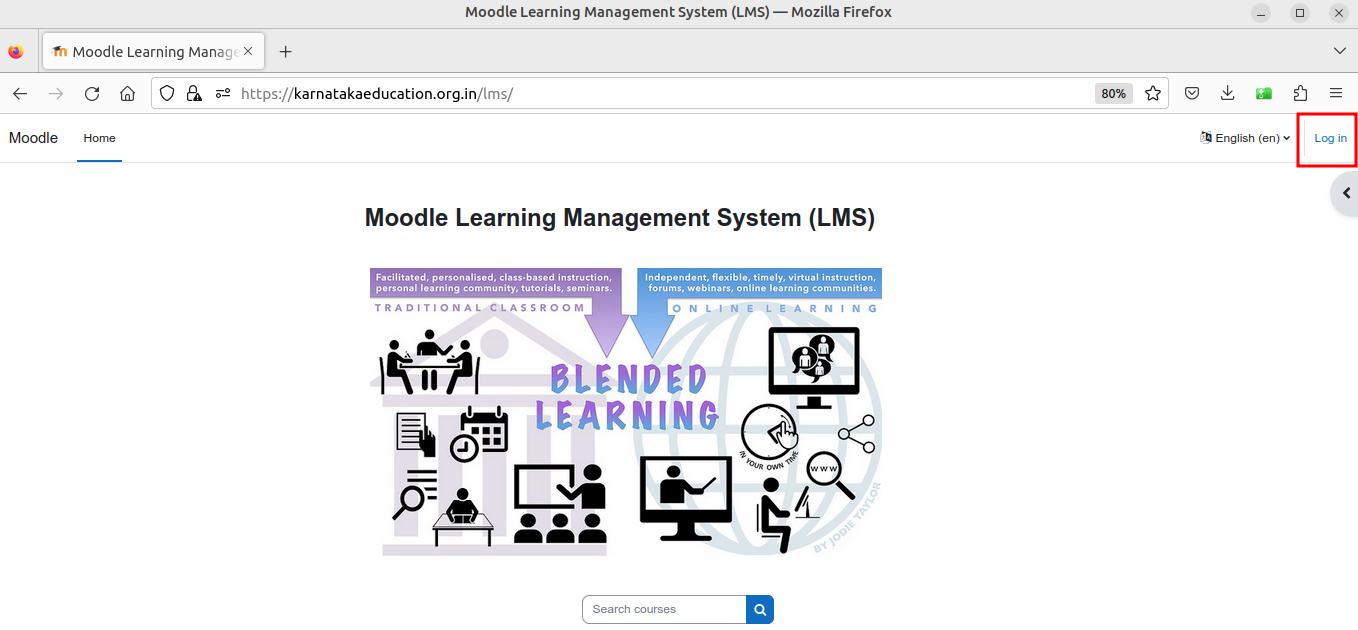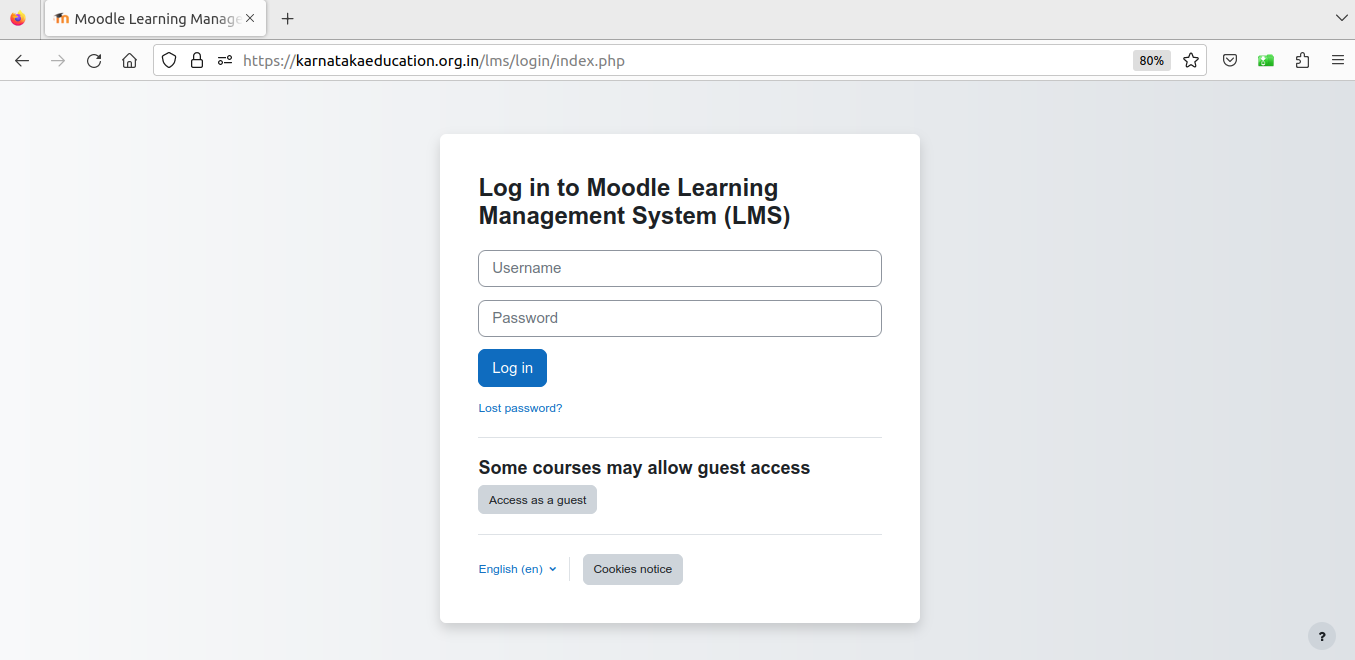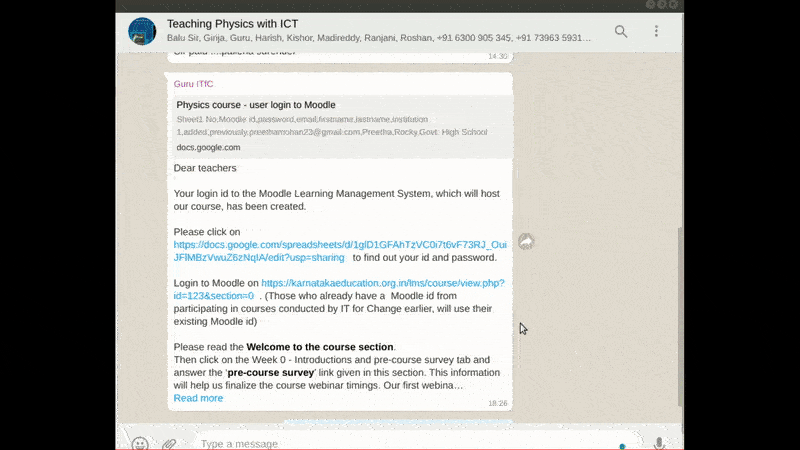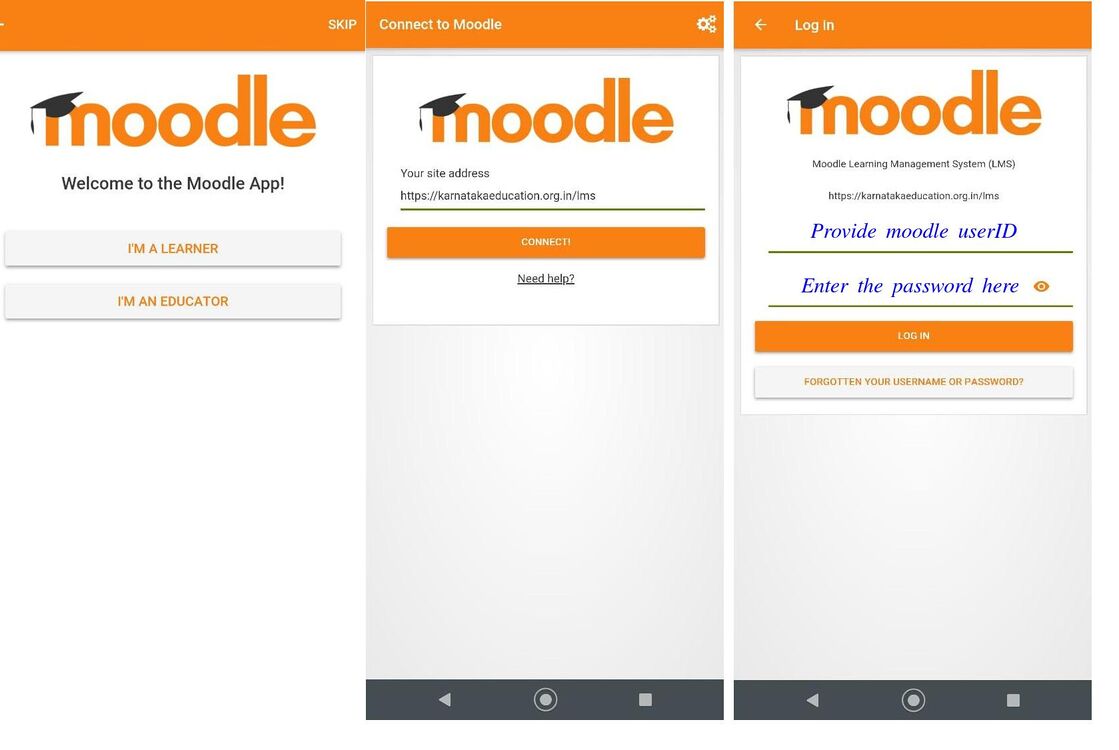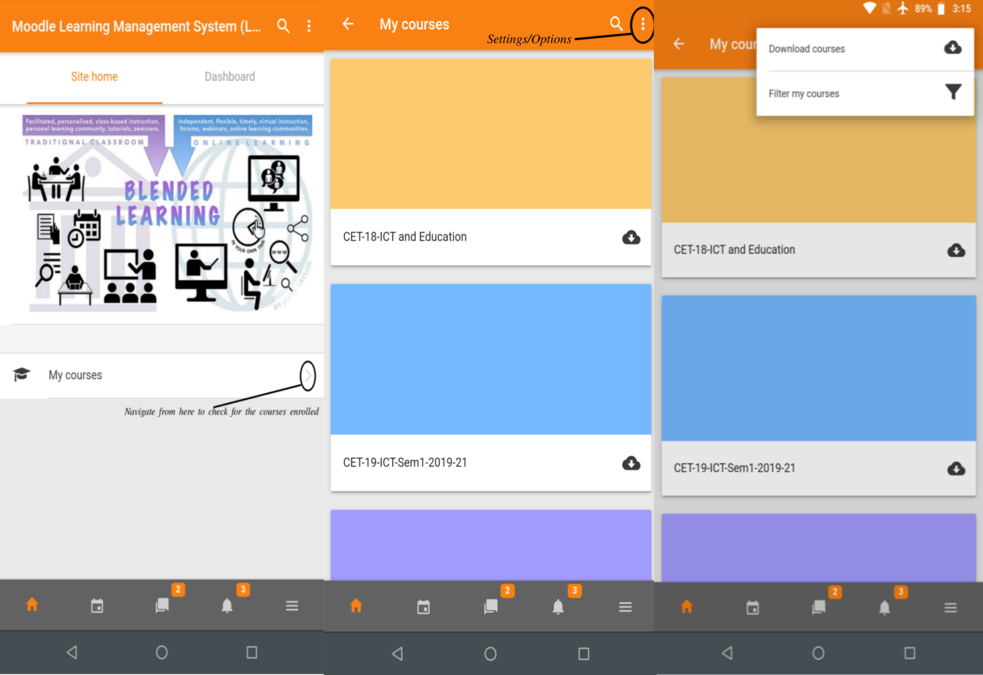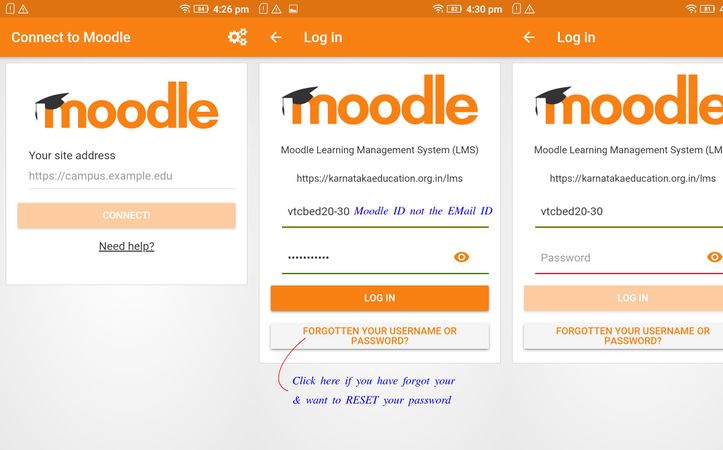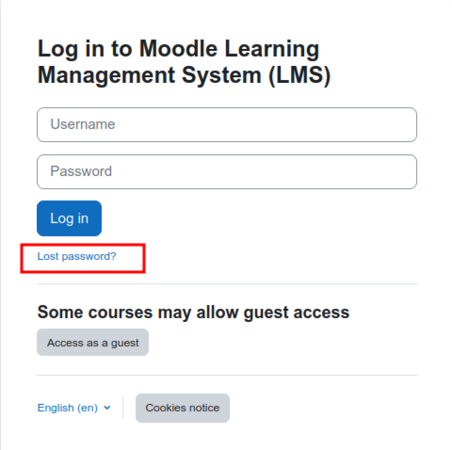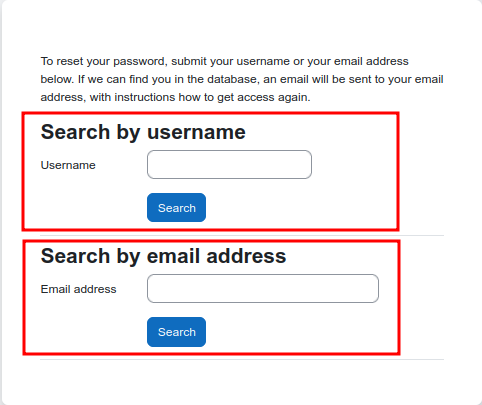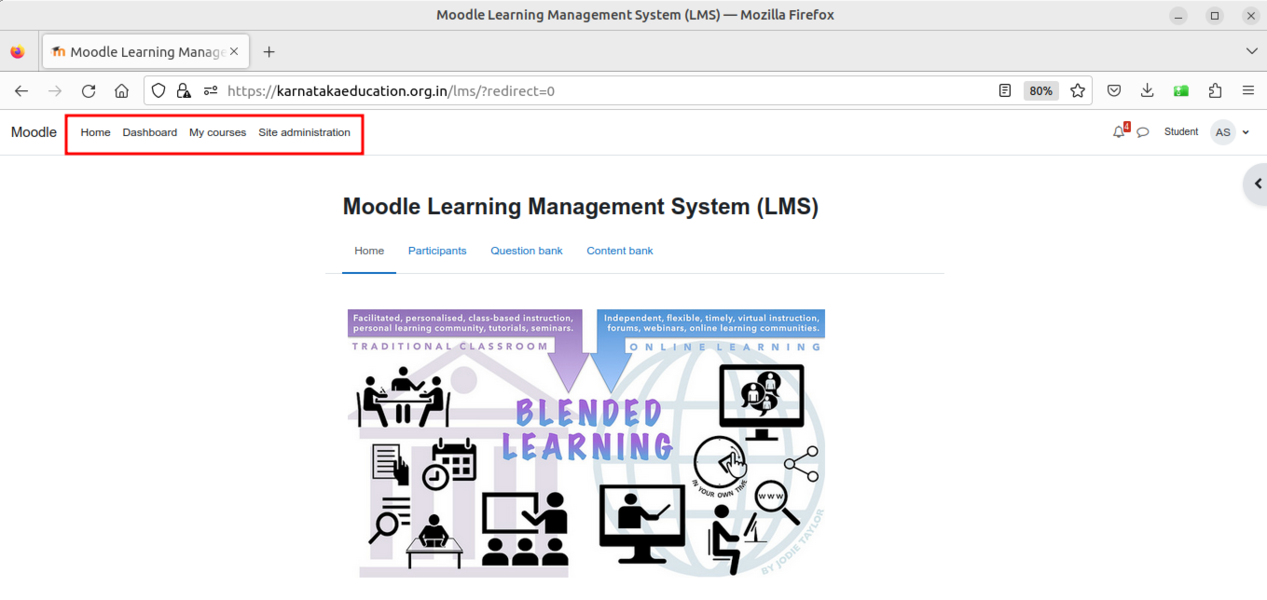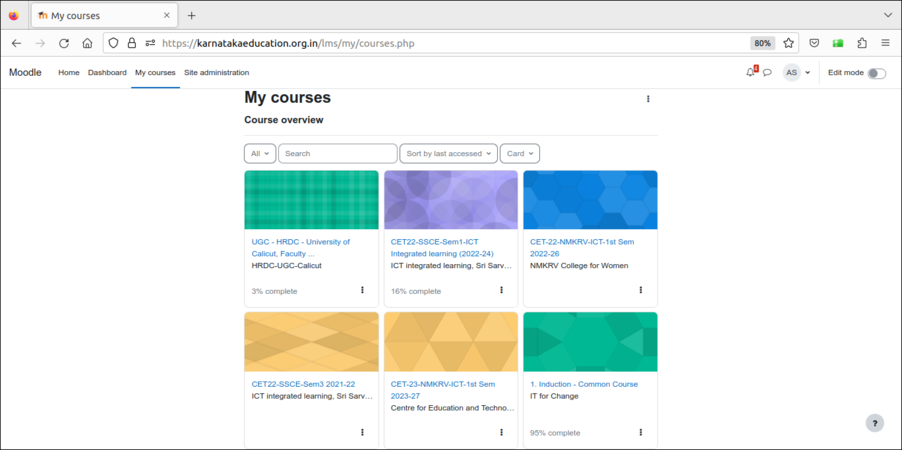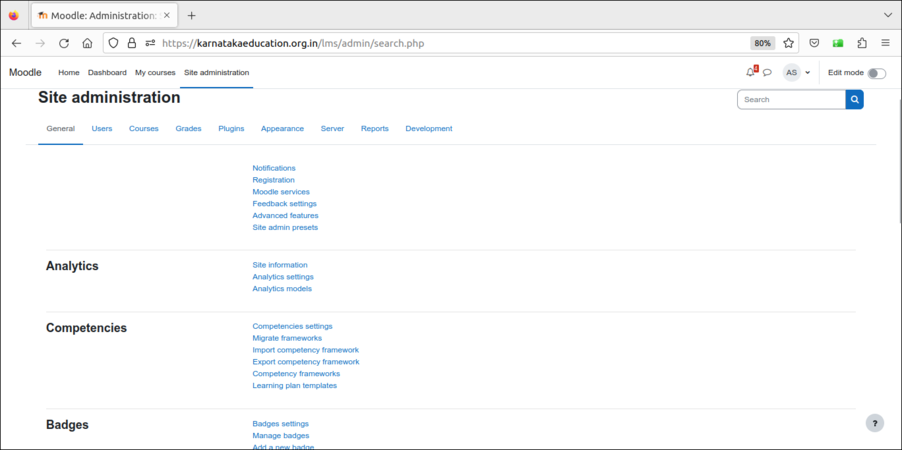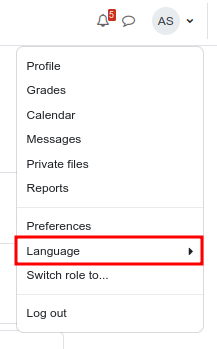Difference between revisions of "Learn Moodle"
| (368 intermediate revisions by 7 users not shown) | |||
| Line 1: | Line 1: | ||
| + | [https://karnatakaeducation.org.in/KOER/index.php/ಮೂಡಲ್_ಕಲಿಯಿರಿ ಕನ್ನಡದಲ್ಲಿ ನೋಡಿ] | ||
| + | |||
| + | {| style="width:100%;font-size:80%;border-collapse:separate;border-spacing:10px;" | ||
| + | |{{Color-table|theme=8|title=[[Learn_Moodle_-_Educators|Moodle for Educators]]}} | ||
| + | |{{Color-table|theme=9|title=[[Learn_Moodle_-_Students|Moodle for Students]]}} | ||
| + | |} | ||
=== Introduction === | === Introduction === | ||
| + | Moodle is an open-source Learning Management System (LMS) that facilitates online learning and training for educational institutions, including teacher education programs. Designed to create an interactive and flexible learning environment, Moodle allows educators to build customized courses, deliver content, and engage with students through various digital tools. For teacher educators, teachers and student teachers, Moodle offers a powerful platform for the management of instructional materials, collaboration, and assessment. | ||
==== Basic information ==== | ==== Basic information ==== | ||
{| class="wikitable" | {| class="wikitable" | ||
|ICT Competency | |ICT Competency | ||
| − | |Moodle is a learning | + | |Moodle is a learning management system (LMS) designed to provide educators, administrators and learners with a robust, secure and integrated system to create personalised and collaborative learning environments. |
|- | |- | ||
|Educational application and relevance | |Educational application and relevance | ||
| − | |It | + | |Moodle provides and on-line platform for collaborative learning. It empowers teachers to set-up courses, provide learning resources and activities for the course and assess learners. Teachers and learners can share ideas and experiences using the on-line discussion forums in Moodle. |
| − | |||
|- | |- | ||
|Version | |Version | ||
| − | | | + | |Currently using 4.4.3 |
|- | |- | ||
|Other similar applications | |Other similar applications | ||
| − | | | + | |[https://chamilo.org/en/ chamilo] [https://openedx.org/ openedx] [https://www.sakailms.org/ Sakai LMS] |
|- | |- | ||
|The application on mobiles and tablets | |The application on mobiles and tablets | ||
| − | |It is a web based | + | |It is a web based application, and can be accessed through a browser on any device supporting browsing. |
| + | [https://play.google.com/store/apps/details?id=com.moodle.moodlemobile&pcampaignid=web_share Moodle app from Playstore] | ||
|- | |- | ||
|Development and community help | |Development and community help | ||
| Line 23: | Line 30: | ||
|} | |} | ||
| + | ==== Install Moodle app on your phone ==== | ||
| + | Since Moodle is an Free and Open source application and it is available for smart phone, download Moodle mobile app from [https://play.google.com/store/apps/details?id=com.moodle.moodlemobile&hl=en_IN google play store].<br> | ||
| + | * After downloading the "Application" just you need to follow the steps & install the Moodle App in your smartphone.<br> | ||
| + | * When the installation is complete login to the "App" through the "Moodle ID" & "Password" provided. | ||
=== Working with Moodle === | === Working with Moodle === | ||
| − | + | Moodle is a free and open Learning Management System (LMS). You can configure any number of courses on Moodle. You can categorise courses as required. | |
| − | + | <gallery mode="packed" heights="500"> | |
| − | + | File:Moodle Main page2.png|Karnataka Education server Moodle main page | |
| − | <gallery mode="packed" heights=" | ||
| − | File: | ||
| − | |||
</gallery> | </gallery> | ||
| + | ====Logging in from Web browser==== | ||
| + | Make sure you have received your credentials before you try to login to your moodle account. If you have the credentials, then on top right as mentioned in the above image (Karnataka Education server Moodle main page) --> click 'login'. | ||
| − | + | <gallery mode="packed" heights="450"> | |
| + | File:Moodle login screen.png|Moodle login screen | ||
| + | </gallery> | ||
| − | + | It shows the "Moodle login screen". Give your credentials here and click 'Login'. Once you login, you can access the list of enrolled courses and you will see your initials on the top right corner of the screen. | |
| − | Once you | + | [[File:How_to_login_to_moodle_course_page_using_computer.gif|alt=|center]] |
| + | Watch this below animation to know detailed steps to login to Moodle course page <br> | ||
| − | + | ==== Configure your Moodle app and access your course ==== | |
| − | + | First you need to Install the Moodle Mobile App from the [https://itunes.apple.com/ca/app/moodle-mobile/id633359593?mt=8 Apple App (Phone user)] Store OR the [https://play.google.com/store/apps/details?id=com.moodle.moodlemobile&hl=en Google Play Store (Android user)].<gallery mode="packed" heights="500px" caption="Moodle - Login to the course"> | |
| + | File:Moodle Mobile App.jpeg|Moodle App login screen | ||
| + | </gallery> | ||
| + | #In the first '''Welcome to the Moodle app!''' screen you need to click on '''I'M A LEARNER.''' | ||
| + | #You will need to enter in the Moodle website address: https://karnatakaeducation.org.in/lms/, click on "'''connect'''". | ||
| + | #In next screen, enter your moodle '''username''' and '''password''' (which shared from course faculty). | ||
| − | <gallery mode="packed" heights=" | + | <gallery mode="packed" heights="450px" caption="Accessing the Moodle App"> |
| − | File:Moodle | + | File:Moodle Settings 1.png|Steps to access the course & download |
| − | |||
</gallery> | </gallery> | ||
| + | After logging in to Moodle App, we can find the home screen as shown in screenshot 1, to access the courses we're enrolled to click on the ''' My courses''' and then tap on the course to view the course content. | ||
| − | + | ==== How to reset Moodle login password on Phone ==== | |
| + | When you forget your Moodle ID or Password, it can be reset by following the below steps as shown in screenshots. | ||
| − | + | <gallery mode="packed" heights="300" caption="Resetting your forgotten Moodle ID or Password"> | |
| + | File:Moodle Mobile App Forgot password Demo.jpeg|Resetting from Moodle App in smartphone | ||
| + | </gallery> | ||
| − | <gallery mode="packed" heights=" | + | ==== How to reset Moodle login password on Browser ==== |
| − | File:Moodle | + | <gallery mode="packed" heights="300"> |
| − | File: | + | File:Moodle forgot password.png|Click 'lost password' |
| + | File:Moodle Forgot password.png|Choose either username or password | ||
| + | </gallery>If you have forgot your password or simply if you want to reset your password, then in the login screen you can click on the option "Lost password?". This gets you to another page where it asks for either username or email address (the one that has been given while creating your moodle account). Once you either of this, you can reset the password. | ||
| + | |||
| + | ====Moodle Home page==== | ||
| + | <gallery mode="packed" heights="400"> | ||
| + | File:Moodle main page interface.png|Moodle main page interface | ||
</gallery> | </gallery> | ||
| − | + | As we can see in the above image, Moodle contains the following options, | |
| − | the | + | * '''Home,''' the home screen of Moodle https://karnatakaeducation.org.in/lms |
| + | * '''Dashboard,''' shows the recently accessed courses, timeline and calendar | ||
| + | * '''My courses,''' shows the list of courses the user is enrolled for. | ||
| + | * '''Site administration,''' shows the options to administer the settings in moodle | ||
| − | + | <gallery mode="packed" heights="300"> | |
| + | File:Moodle my courses.png|Enrolled courses in thumbnail view | ||
| + | File:Moodle site admin.png|Site administration page | ||
| + | </gallery> | ||
| − | + | A course is a space on a Moodle site where teachers can add the content (learning materials) and activities (pedagogy) for their students. A teacher may be a faculty for more than one course, a course may include more than one teacher and more than one group of learners. | |
| + | |||
| + | Both teachers and students have to be 'registered' for a course (as 'teacher' or as 'student'), this role configuration is done by the Moodle administrator. | ||
| − | ==== | + | ====Advanced Activities==== |
| − | |||
| − | + | 1.Lesson <br>2.Workshop <br> | |
| − | + | ||
| − | + | ====Multi-lingual offering of courses==== | |
| − | + | The multi-language content filter enables resources to be created in multiple languages. Moodle by default will be in English and for running any local languages, language packages need to install in your server (This will be done by your web admin). | |
| − | + | ||
| − | + | <gallery mode="packed" heights="300px"> | |
| − | + | File:Moodle change language1.png|Changing the language | |
| − | <gallery mode="packed" heights=" | ||
| − | File:Moodle | ||
| − | |||
</gallery> | </gallery> | ||
| + | Login to your course and on the top right side of the screen your profile initial, it shows a list of options. Here, you can select the language which you want see your course. | ||
| − | + | * Course format section specifies the kind of format faculty would like to have in their course. | |
| − | * | ||
| − | |||
| − | |||
| − | |||
| − | |||
| + | === Explore Moodle as Educators and Students === | ||
[[Category:Explore an application]] | [[Category:Explore an application]] | ||
| + | {| class="wikitable" style="width:100%;font-size:80%;border-collapse:separate;border-spacing:10px;" | ||
| + | |'''If you are a Educators,''' this manual provides a comprehensive guide for educators using Moodle. It covers course creation, creating resources and adding activities like assignment setup, quizes and etc...{{Color-table|theme=8|title=[[Learn_Moodle_-_Educators|Moodle manual for Educators]]}} | ||
| + | |'''If you are student,''' this guide walks students through Moodle's essential features, including navigating courses, submitting assignments, participating in discussions, and tracking grades.{{Color-table|theme=9|title=[[Learn_Moodle_-_Students|Moodle manual for Students]]}} | ||
| + | |} | ||
Latest revision as of 21:46, 25 February 2025
Introduction
Moodle is an open-source Learning Management System (LMS) that facilitates online learning and training for educational institutions, including teacher education programs. Designed to create an interactive and flexible learning environment, Moodle allows educators to build customized courses, deliver content, and engage with students through various digital tools. For teacher educators, teachers and student teachers, Moodle offers a powerful platform for the management of instructional materials, collaboration, and assessment.
Basic information
| ICT Competency | Moodle is a learning management system (LMS) designed to provide educators, administrators and learners with a robust, secure and integrated system to create personalised and collaborative learning environments. |
| Educational application and relevance | Moodle provides and on-line platform for collaborative learning. It empowers teachers to set-up courses, provide learning resources and activities for the course and assess learners. Teachers and learners can share ideas and experiences using the on-line discussion forums in Moodle. |
| Version | Currently using 4.4.3 |
| Other similar applications | chamilo openedx Sakai LMS |
| The application on mobiles and tablets | It is a web based application, and can be accessed through a browser on any device supporting browsing. |
| Development and community help | Moodle |
Install Moodle app on your phone
Since Moodle is an Free and Open source application and it is available for smart phone, download Moodle mobile app from google play store.
- After downloading the "Application" just you need to follow the steps & install the Moodle App in your smartphone.
- When the installation is complete login to the "App" through the "Moodle ID" & "Password" provided.
Working with Moodle
Moodle is a free and open Learning Management System (LMS). You can configure any number of courses on Moodle. You can categorise courses as required.
Logging in from Web browser
Make sure you have received your credentials before you try to login to your moodle account. If you have the credentials, then on top right as mentioned in the above image (Karnataka Education server Moodle main page) --> click 'login'.
It shows the "Moodle login screen". Give your credentials here and click 'Login'. Once you login, you can access the list of enrolled courses and you will see your initials on the top right corner of the screen.
Watch this below animation to know detailed steps to login to Moodle course page
Configure your Moodle app and access your course
First you need to Install the Moodle Mobile App from the Apple App (Phone user) Store OR the Google Play Store (Android user).
- Moodle - Login to the course
- In the first Welcome to the Moodle app! screen you need to click on I'M A LEARNER.
- You will need to enter in the Moodle website address: https://karnatakaeducation.org.in/lms/, click on "connect".
- In next screen, enter your moodle username and password (which shared from course faculty).
- Accessing the Moodle App
After logging in to Moodle App, we can find the home screen as shown in screenshot 1, to access the courses we're enrolled to click on the My courses and then tap on the course to view the course content.
How to reset Moodle login password on Phone
When you forget your Moodle ID or Password, it can be reset by following the below steps as shown in screenshots.
- Resetting your forgotten Moodle ID or Password
How to reset Moodle login password on Browser
If you have forgot your password or simply if you want to reset your password, then in the login screen you can click on the option "Lost password?". This gets you to another page where it asks for either username or email address (the one that has been given while creating your moodle account). Once you either of this, you can reset the password.
Moodle Home page
As we can see in the above image, Moodle contains the following options,
- Home, the home screen of Moodle https://karnatakaeducation.org.in/lms
- Dashboard, shows the recently accessed courses, timeline and calendar
- My courses, shows the list of courses the user is enrolled for.
- Site administration, shows the options to administer the settings in moodle
A course is a space on a Moodle site where teachers can add the content (learning materials) and activities (pedagogy) for their students. A teacher may be a faculty for more than one course, a course may include more than one teacher and more than one group of learners.
Both teachers and students have to be 'registered' for a course (as 'teacher' or as 'student'), this role configuration is done by the Moodle administrator.
Advanced Activities
1.Lesson
2.Workshop
Multi-lingual offering of courses
The multi-language content filter enables resources to be created in multiple languages. Moodle by default will be in English and for running any local languages, language packages need to install in your server (This will be done by your web admin).
Login to your course and on the top right side of the screen your profile initial, it shows a list of options. Here, you can select the language which you want see your course.
- Course format section specifies the kind of format faculty would like to have in their course.
Explore Moodle as Educators and Students
| If you are a Educators, this manual provides a comprehensive guide for educators using Moodle. It covers course creation, creating resources and adding activities like assignment setup, quizes and etc... | If you are student, this guide walks students through Moodle's essential features, including navigating courses, submitting assignments, participating in discussions, and tracking grades. |
